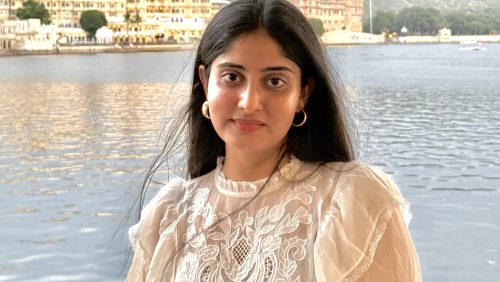
"Hopkins doesn’t ask me to choose between Neuroscience and Public Health"
Satya Chaudhary, an undergraduate in Neuroscience and Public Health, shares how personal experience and grassroots advocacy shaped her decision to study at Johns Hopkins.
What program are you joining at Hopkins, and why?
I’ll be joining the Krieger School of Arts and Sciences, where I plan to double major in Neuroscience and Public Health.
A seemingly simple question has been bugging me: How can research-driven corrective lifestyle interventions for long-term brain health be established for today’s and future adolescents? Answering that question fuels my decision to pursue both neuroscience and public health—it brings together my curiosity about the brain with my desire to understand how healthcare systems and social behaviour interact to shape health outcomes.
This path became personal when my vibrant grandmother was left bedridden by Parkinson’s. I was devastated, yet deeply curious. I began speaking to her neurologist, who not only explained neurodegeneration but also emphasized the long-term impact of sleep on brain health. He introduced me to Dr. Matthew Walker’s work, which completely shifted my perspective. Learning that 0% of people can function properly on less than six hours of sleep was uncomfortably eye-opening, especially for a teenager like me, surviving on six at best. This prompted a steady inquisitiveness about the relationship between sleep, neurobiology, and public health behaviour. I explored it further through Dr. Walker’s Why We Sleep, an online course, and a research paper on sleep disorders, through which I discovered I also enjoy scientific writing and learn best through that process.
Double majoring at Hopkins will give me the ideal foundation to pursue these questions—from understanding neural mechanisms to developing community-level health interventions grounded in evidence and empathy.
How did you decide on Johns Hopkins as the place to begin your college journey?
I wasn’t initially planning to apply to Hopkins, but a gentle nudge from a friend convinced me to give it a shot. What drew me to Hopkins was how it doesn’t force me to choose between neuroscience and public health. I’ve been equally interested in brain and sleep research and in grassroots health initiatives. Hopkins’ strength in both fields, its openness to undergraduates in research, and its culture of turning ideas into action made it the right place for me.
What drew me to Hopkins was how it doesn’t ask me to choose between the brain and the bigger picture. I’ve spent the past few years working on grassroots menstrual health initiatives while being equally drawn to interdisciplinary brain and sleep research and the science of behavior. I was looking for a place where both could grow side by side.
Hopkins stood out for its excellence in neuroscience and public health, its openness to undergrads participating in real research early on, and the clear support for translating ideas into action.
JHU will empower the burgeoning changemaker in me in ways that I intend, hope, and dream about, and I will uphold the college’s and JHU’s mission to address societal challenges through research.
What excites you most about starting this new chapter?
I’m really looking forward to meeting people who get excited about the same weirdly specific things I do. I’m mostly excited to connect through impromptu jam sessions in the new student centre’s studio spaces or over chocolate chip pancakes from Carma’s and long conversations. I’m a bit nervous about finding my way around the Homewood Campus at first and settling into a new city, but I’m excited to explore Baltimore one small adventure at a time, starting with Cross Street Market and a long overdue walk by the Inner Harbor.
It would also be wonderful if you could share a little bit about Moontide—how you started it, why it matters to you, and what impact it’s had so far?
MoonTide is my bold attempt at creating a comprehensive, illustrated comic book designed to dispel myths around menstruation and menstrual hygiene—topics that remain massively taboo in Indian households. Through this comic, I’ve tried to draw out reserved young girls and urge them to debunk long-standing myths and share their stories. MoonTide’s larger mission is to prevent such dehumanizing cycles—by helping girls stay in school, reclaim their dignity, and avoid being pushed prematurely into the workforce.
So far, MoonTide has reached over 1,015 girls across 22 schools in villages across rural Gujarat. Under MoonTide’s ambit, I distribute sanitary napkins at no cost to girls, as part of a synergistic-collaboration with Smart Hygeia, advertising their products in the comic. The project has been recognized by Member of Parliament Mr. Mayank Nayak and MLA Mr. Mukesh Patel, and has been featured by The Better India and Girl Power Talk.
What do you wish young people in India discussed more about public health?
I wish more young people in India were taught that public health is about dignity, dialogue, and representation not just disease prevention. When I created MoonTide, I didn’t expect a comic book to become a medium of quiet resistance. But in room after room, I saw how giving girls the language and imagery to understand their bodies was a radical act. Not because the facts were new, but because no one had ever said them out loud.
That’s when it clicked to me that information alone doesn’t change lives. Cultural silence does more damage than ignorance. I believe the future of public health in India depends on how well we listen, especially to the voices that have long been excluded. Whether it’s periods, consent, or mental well-being, we need to stop waiting for comfort before we start conversations.